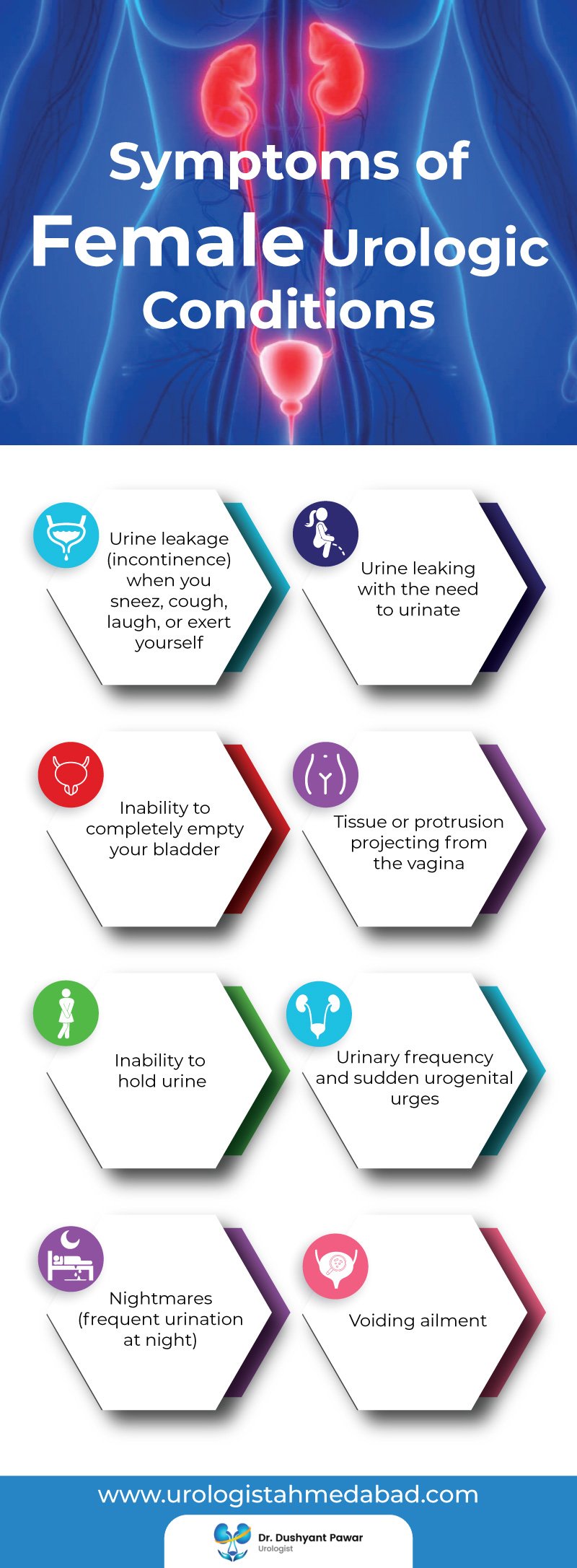Not just males can see urologists. Women could also require care from this kind of physician. Women do have some female urologic conditions. Treatment for conditions affecting the urinary system is the specialty of urologists. It is a system made up of organs like the kidneys, tubes, and muscles. Urologists treat both male and female reproductive system issues.
A urogynecologist may be consulted by some females. This practitioner is a gynecologist with additional training in the management of pelvic organ prolapse and other diseases affecting the female reproductive system and urinary tract.
Table of Contents
What is Female Urology?
The medical specialty of urology focuses on conditions affecting the urinary tract system, which includes the kidneys, adrenal glands, ureters, bladder, and urethra. Urology’s subspecialty of female and reconstructive urology diagnoses treats and evaluates patients with urine incontinence, urological disorders, and urinary tract reconstruction.
This subspecialty’s female urology branch deals with a variety of female-specific disorders, including urine incontinence, hyperactive bladder, and pelvic organ prolapse. A female urologist with expertise in treating these conditions is well-versed in female pelvic floor issues. Additionally, they can treat urological disorders such as urinary tract infections (UTI), cystitis, kidney stones, kidney cancer, and bladder cancer that affect both sexes.
What Conditions are Treated within Female Urology?
Conditions commonly treated within female urology include:
- Urinary incontinence
- Overactive bladder
- Pelvic prolapse
- Pelvic floor problems
- Urinary tract infections
- Cystitis
- Kidney stones
- Kidney cancer
- Bladder cancer
When should you see a Urologist?
Women should see a urologist who specializes in Female Urologic Treatment if they experience any of the following symptoms:
- Blood in their urine
- Abdominal or pelvic pain
- Cloudy urine
- A frequent urge to urinate
- Pain or a burning sensation when urinating
- Frequent urinary tract infections
- Urinary leakage
Female Urologic Conditions’ Symptoms

Various symptoms of female urologic diseases might occur; however, you should see your doctor if you are noticing:
- Urine leakage (incontinence) when you sneeze, cough, laugh, or exert yourself
- Urine leaking with the need to urinate
- Inability to completely empty your bladder
- Tissue or protrusion projecting from the vagina
- Inability to hold urine
- Urinary frequency and sudden urogenital urges (also known as urge incontinence)
- Nightmares (frequent urination at night)
- Voiding ailment (dysfunction related to urination, such as a weak urine stream or slow emptying of the bladder)
Conditions We Treat
We diagnose and treat a wide variety of female urological conditions.
Recurrent Urinary Tract Infections (UTI): Since the female urethra is much shorter than the male urethra, women are far more prone to develop a UTI than males. UTIs can be diagnosed and treated right away if they are rare. However, there are preventative techniques accessible if they keep happening. To determine whether there are any risks for recurring UTIs, it is occasionally essential to do certain diagnostic procedures.
Overactive Bladder (OAB): Urinary frequency (frequent trips to the restroom), urinary urgency (a sudden, inexplicable need to pee), and occasionally urinary urge incontinence are all indications of OAB (leakage of urine that occurs with a sudden uncontrollable desire to urinate).
Stress Urinary Incontinence (SUI): When you laugh, sneeze, cough, run, or engage in other activities that put a strain on your bladder, you may experience stress incontinence.
Pelvic Organ Prolapse (POP): When the structures surrounding the vagina deteriorate, POP occurs. Childbirth, being overweight, connective tissue problems, and surgical procedures like a hysterectomy are just a few causes of this. A protrusion in the vagina may be felt or seen when your pelvic floor weakens. This may be accompanied by pain, fecal or urine incontinence, and sexual issues. Women frequently feel a bulge in the vagina, and we need to identify what is protruding. The numerous varieties of vaginal bulge go by the following names:
- Cystocele: the condition in which the bladder protrudes through the vaginal opening
- Rectocele occurs when the rectum pushes on the vaginal back wall.
- When the uterus prolapses into the vagina, it is called uterine prolapse.
- Intestinal protrusion into the vagina is known as an enterocele (this happens typically after someone has had a hysterectomy)
Genito-Urinary Fistula: An improper connection between the bladder and the vagina or uterus is known as a Genito-urinary fistula. Radiation therapy, delivery trauma, or complications from earlier pelvic surgeries can all lead to fistulas. Diabetes and pelvic inflammatory illness are risk factors. Urinary leaking from the vagina is the predominant sign of a genitourinary fistula.
Urethral Diverticulum (UD): UD happens when a pouch or bulge develops below the urethra. This pouch continually fills with pee when you urinate since it often links to the urethra, resulting in several symptoms like painful urination (dysuria) and dribbling urine after you believe you’re done urinating painful intercourse (dyspareunia), and perhaps urinary tract infections. UD may occasionally go unnoticed; we only detect it through routine pelvic examinations or radiological treatments.
Because many of these symptoms are similar to those of other illnesses, we always take care to obtain a complete medical history, perform a thorough physical examination, and perform urine tests, endoscopic examinations of the bladder, and specialized urethra and radiologic imaging to ensure we make an accurate diagnosis and recommend the most suitable course of action.
Conclusion
Dr. Dushyant Panwar is the best urologist in Ahmedabad, a specialist for all urological issues specific to women. Female Pelvic Medicine and Reconstructive Surgery is a specialization of urology. We have had great success restoring a full and active lifestyle to women who have incontinence, pelvic organ prolapses, and other urogynecology problems.





